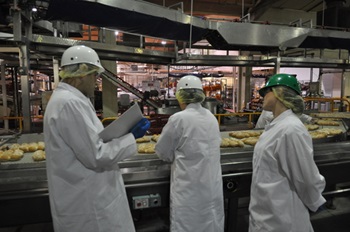Why Continual Improvement is More than Corrective Action
 Getting SQF certified is, of course, an accomplishment. Sustaining the high commitment to quality and food safety is crucial, not only to pass regular audits but to continue to improve the efficacy of a system.
Getting SQF certified is, of course, an accomplishment. Sustaining the high commitment to quality and food safety is crucial, not only to pass regular audits but to continue to improve the efficacy of a system.
In a presentation on “Continued Improvement of Your SQF System for Sustained Success” during the SQF Unites event in October, Colin Christmas of EAGLE Certification Group underlined what continuous improvement really about. In fact, he suggests a better definition of “continual” improvement, which implies thoughtful, steady changes and adjustments.
In an era marked by constant change and frequent challenges, expecting a straight upwards line of improvement over time is somewhat unrealistic. “It’s much more about problem-solving – you want to improve something and sustain it,” explained Colin, EAGLE’s managing director.
Achieving continual improvement –is certainly expected by auditors and SQF food safety professionals — goes beyond taking corrective actions, according to this expert. Using a wider, more inclusive lens, continual improvement can be made through various steps and requirements:
- Understanding and leveraging non-conformances: While those who are SQF certified can get wrapped up in the citation of major or minor non-conformances, there has been a paradigm shift in recent years to celebrate non-conformances. Addressing non-conformances allows a company to take care of issues before they become a problem with customers and consumers and can be used to improve processes. That said, repeated non-conformances are an indication that the site has not effectively worked to solve problems that are happening over time. Likewise, if there are several non-conformances related to a critical component like pathogen management, this could be a sign of possible systematic failure.
- Interpreting and using audit scores: SQF audit scores allows the site to improve over time. It’s problematic if a company is downgraded after every audit, but if there is a one-time score slide from “excellent” to “good”, it can show customers that the business is taking steps to drill down on temporary weaknesses. Being transparent with customers about the reasons behind a lower score can actually demonstrate how serious a manufacturer is about continually raising the bar for quality and safety.
- Taking consistent corrective actions: Is problem-solving done in a consistent way? Who is on the team for taking corrective actions? It shouldn’t just be food safety and quality staffers: a cross-functional, diverse team with representatives from other areas like engineering, leadership and logistics is a reflection of a total commitment to improvement. The cross-functional team should be led by different problem solvers and, perhaps a “coach” to facilitate discussions and actions to avoid any potential group-think.
In his SQF Unites presentation, Colin also stressed timely internal and external communications and underscored the significance of internal audits that go beyond a once-a-year SQF review. Measuring improvement by comparing objectives vs achievement of results is another way to make the food safety and quality system better over time, he said.
As a takeaway, Colin recommended the use of an improvement plan template in which all actions can be logged and shared cross-functionally, most importantly with leaders who are accountable for the improvement of the food safety system. Using a risk-based approach to prioritize areas for improvement makes the plan dynamic and ultimately successful. “It’s a one-stop-shop for improvement,” he pointed out.
Until December 30, 2021, you can gain access to the more than 40 SQF Unites sessions for $195. Learn more about SQF Unites content and expert presenters on the SQF Unites website.
Recent Blog Posts
Renee McVey is one of the first industry professionals to hold the Safe Quality Food Institute’s new Certified SQF Practitioner credential, which is administered by Exemplar Global.
The Safe Quality Food Institute announces ASI Food Safety's Stacey Brown and Redbarn Pet Products' Renee McVey as recipients of the 2025 SQF Excellence Awards.
I’m thrilled to share an update on our journey in developing SQF Code Edition 10—a process built on collaboration, transparency, and shared industry insights.




